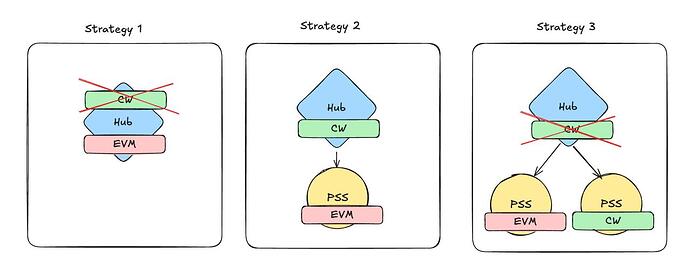Today, CosmWasm (CW) is permissioned on the Cosmos Hub. This means that in order to deploy a contract, an address must first be whitelisted via an on-chain vote. Once whitelisted, that address can deploy as many contracts as it wants without going through governance again—unless its permission is later revoked.
Current situation:
Very few deployments are happening on the Hub.
Suspected reasons:
-A project needs visibility and certainty to get started. It’s hard to convince investors with a pitch like: “We’ll build for months, but we’re not sure if we’ll be allowed to deploy.”
-The process is too slow and clunky, due to slow or inefficient governance.
-Teams are sometimes reluctant to expose themselves publicly or be judged in a vote.
-The whitelisting mechanism lacks granularity: once approved, an actor can deploy unlimited contracts without further review.
-The Hub isn’t seen as a developer-friendly environment compared to simpler and faster alternatives (Neutron, Osmosis, etc.).
-Low current activity creates a loop of inertia: low usage = low attractiveness.
Proposed idea:
Simplify the process or enable permissionless CosmWasm deployment on the Hub.
Strategic context:
Ongoing discussions on Telegram suggest a new direction is emerging with growing community consensus. Three strategies are currently being discussed (see image attached):
Strategy 1: Add permissionless EVM and remove CW from the Hub → rejected.
Strategy 2: Keep CW on the Hub, but create a PSS permissionless EVM chain governed by the Hub with ATOM as the only gas token → feasible quickly and at low cost.
Strategy 3: Remove CW from the Hub, and create both a PSS permissionless EVM chain and a PSS permissionless CW chain → longer timeline.
Strategy 2 thus appears to be the most pragmatic short-term path.
Why CosmWasm?
-Several well-known Cosmos teams want to deploy on the Hub.
-CosmWasm is part of the native Cosmos stack, with a well-equipped ecosystem (IBC integration, CosmJS, etc.).
-Some live applications are becoming critical (e.g. Hydro).
-The Hub could attract meaningful use cases if development becomes easier.
-CosmWasm enables strong modularity and security through smart contracts.
Historical concerns:
The main worry has always been security: risks of exploits, hacks, rug pulls, etc.
Lessons learned:
Neutron, a permissionless CosmWasm chain, shows that:
-Deployment volume remains reasonable.
-No major incidents have occurred to date.
-Permissionlessness hasn’t led to overload or chaos.
And if an issue were to arise, ICL (in charge of Hub software) could respond quickly.
In conclusion:
Should we enable permissionless CosmWasm deployment on Cosmos Hub?
Looking forward to your feedback.


